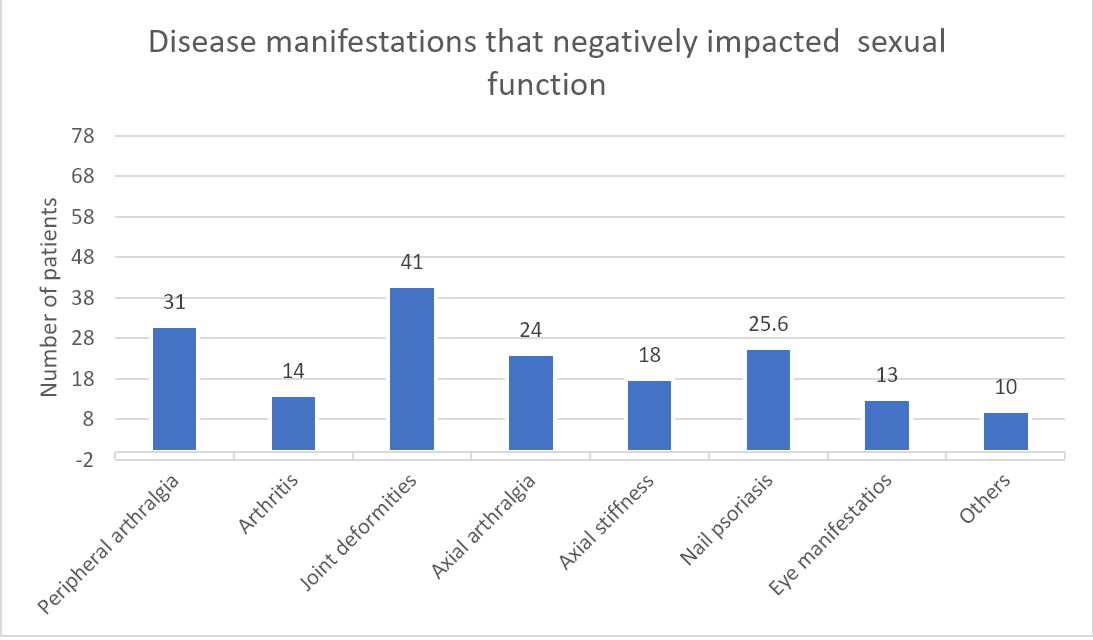Session Information
Session Type: Poster Session C
Session Time: 10:30AM-12:30PM
Background/Purpose: Spondyloarthritis (SpA) impacts patient’s life, including functionality, QoL, emotional state, and sexual function. The current study was conducted to determine the frequency of sexual function abnormalities and the risk factors associated with this complication.
Methods: We conducted a study at a tertiary care center in Mexico City from Oct 2024 to Apr 2025. We included patients diagnosed with SpA and used self-administered questionnaires to assess different PROs (disease activity, QoL, physical function, anxiety, and depression). Sexual function was evaluated using CSFQ-14. Additionally, patients were asked which specific manifestation of their disease harmed their sexual function from multiple different options, or to write it if not present. We also asked whether patients had discussed sexual health with their rheumatologist.
Results: Seventy-eight patients were included; 63% were men, with a median age of 48 years (IQR 34-57). Most patients had axial disease (n=44, 56.4%), and 55.7% (n=43) had a positive HLA-B27. Sexual dysfunction was reported by 60.3% (n=47). Table 1 summarizes the characteristics of patients with and without sexual dysfunction. Patients with sexual dysfunction had a higher prevalence of radiographic disease, more comorbidities, and higher depression scores. In the logistic regression, hypertension (OR 12.5, 95%CI 1.3-122.1) and depression score (OR 1.2, 95%CI 1.0-1.4) were associated with sexual dysfunction; conversely, lower weight (OR 0.93, 95%CI 0.8-0.9) and non-radiographic axial disease (OR 0.06, 95%CI 0.007-0.53) were associated with a protective effect. Three distinct patient clusters were identified using principal component analysis (PCA) of four standardized clinical variables (CSFQ-14, HAQ, BASDAI, ASQoL): cluster 1 (preserved sexual function, low disease activity, and better QoL), cluster 2 (moderate impairment across domains), cluster 3 (marked sexual dysfunction, high functional limitation, and poor QoL). PCA1 reflected the overall clinical burden (HAQ, BASDAI, ASQoL), while PCA2 distinguished the sexual function. This confirms that sexual health forms a distinct axis, partially independent from physical and inflammatory burden. (Figure 1A).Most patients (n=47, 60.3%) considered that at least one disease manifestation harmed their sexual function (Figure 2). A high proportion of patients (n=53, 67.9%) reported they never talked about sexual function with their rheumatologist, but most (n=71, 91%) considered it was important for their rheumatologist to discuss these issues.
Conclusion: Sexual dysfunction is a frequent and often under-recognized complication in these patients. Radiographic disease, hypertension, and depression were independent risk factors, whereas non-radiographic SpA was associated with preserved sexual function. Cluster analysis revealed three distinct clinical profiles, highlighting a subgroup with substantial clinical impairment and another with preserved sexual function despite active disease, suggesting resilience mechanisms. These findings underscore the need for personalized strategies and for proactively addressing sexual health.
 Table 1. Patient characteristics according to the presence or absence of sexual dysfunction
Table 1. Patient characteristics according to the presence or absence of sexual dysfunction
.jpg) Figure 1. Principal component analysis identified two axes. Component 1 (52.7%) captured overall clinical burden (HAQ, BASDAI, ASQoL). Component 2 (25.7%) was defined by CSFQ-14, representing a distinct dimension of sexual dysfunction. Three clinical clusters emerged across these axes, including one with high disease burden and severe sexual dysfunction..
Figure 1. Principal component analysis identified two axes. Component 1 (52.7%) captured overall clinical burden (HAQ, BASDAI, ASQoL). Component 2 (25.7%) was defined by CSFQ-14, representing a distinct dimension of sexual dysfunction. Three clinical clusters emerged across these axes, including one with high disease burden and severe sexual dysfunction..
.jpg) Figure 2. Most frequently reported disease manifestations that patients identified to have a negative impact on their sexual function
Figure 2. Most frequently reported disease manifestations that patients identified to have a negative impact on their sexual function
To cite this abstract in AMA style:
Valdez-López M, Barrera-Vargas A, Merayo-Chalico J, Contreras-Yañez I, Abitia Borboa C, García-Herrera I, Pérez-Gamboa R, Guaracha-Basáñez G. Uncovering Clinical Phenotypes of Sexual Dysfunction in Spondyloarthritis: A Multidimensional Analysis [abstract]. Arthritis Rheumatol. 2025; 77 (suppl 9). https://acrabstracts.org/abstract/uncovering-clinical-phenotypes-of-sexual-dysfunction-in-spondyloarthritis-a-multidimensional-analysis/. Accessed .« Back to ACR Convergence 2025
ACR Meeting Abstracts - https://acrabstracts.org/abstract/uncovering-clinical-phenotypes-of-sexual-dysfunction-in-spondyloarthritis-a-multidimensional-analysis/
